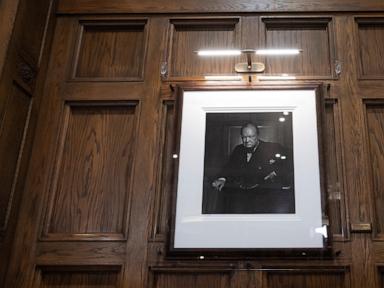What might Winston Churchill think of Donald Trump?

“What do you think Donald Trump would make of Winston Churchill?”
That out-of-the-blue question was asked the other day at Churchill’s home, Chartwell, outside London, where I was speaking about the former British prime minister’s relationships with Franklin Roosevelt and Dwight Eisenhower during the 1940s and 1950s.
Haltingly, with some reluctance to discuss American politics in such a historic setting, I responded that Trump prominently displayed a bust of Churchill in the Oval Office throughout his previous White House term.
Churchill’s face of bulldog, never-surrender tenacity often appeared over the president’s left shoulder in photographs and television reports. The presence of the bust certainly displayed Trump’s admiration for the United Kingdom’s wartime leader, I said, subsequently learning it will return to the president-elect’s office after the January inauguration.
Once that was settled, it seemed appropriate (to me at least) to consider the comparison from the opposite perspective. “It’s probably more important here at Chartwell,” I suggested, “to consider how Churchill might think of Mr. Trump.”
Without trying to sound pedantic, I explained that Churchill’s devotion to democracy was the lodestar of his life, and he was willing to fight for it in World War I and to lead his Nazi-threatened island in World War II.
In his own political career spanning over six decades, Churchill was a candidate in 21 parliamentary elections to gain a seat in the House of Commons. He won 16 times but lost on five other occasions.
Despite individual and party setbacks, Churchill kept returning to the democratic arena with unflagging determination. Indeed, as amusingly ironic as it might sound given Churchill’s legendary enjoyment of alcoholic beverages, he was defeated in 1922 by a temperance-movement candidate representing the Scottish Prohibition Party, Edwin Scrymgeour.
In that election, the first of three straight losses for Churchill, his campaigning was restricted by an acute case of appendicitis requiring surgery. Looking back years later, he wrote, “In the twinkling of an eye, I found myself without an office, without a seat, without a party and without an appendix.”
Win or lose, Churchill’s motto was, “Trust the people.” He always knew there would be future elections. He would stand — we Americans, more accurately, say run — and compete again.
As I pointed out at Chartwell, democracy invariably produces more losers than winners. Voters decide who will be their leaders and who will govern. The peoples’ say counts and deserves collective trust. As tactfully as possible, I questioned Trump’s allegiance to that way of thinking.
Churchill dedicated much of his nine-decade life to the sovereignty of the ballot in a free society. His unyielding commitment is well worth remembering at this time — the 150th anniversary of his entry into the world he helped shape.
Robert Schmuhl is an emeritus professor of American studies and journalism at the University of Notre Dame and the author of “Mr. Churchill in the White House: The Untold Story of a Prime Minister and Two Presidents.”
-

Winston Churchill portrait returns to Ottawa after international art caper
A stolen portrait of Winston Churchill that was swapped with a forgery during the pandemic has returned to its rightful placeEntertainment - ABC News - November 15 -

Winston Churchill portrait returns to Ottawa after international art caper
A stolen portrait of Winston Churchill that was swapped with a forgery during the pandemic has returned to its rightful placeWorld - ABC News - November 15 -

George Conway isn't taking Trump win ‘as badly as people might think’
Pundit George Conway, an outspoken Republican critic of President-elect Trump, said he’s not taking the election results “as badly as people might think.” “The disturbing thing about this election ...Politics - The Hill - November 11 -

Donald Trump Thinks He Won’t Have Enough Power
The once and future president’s constitutional gimmicks are embarrassingly transparent.Top stories - The New York Times - 6 days ago -

What the next four years might bring from the Trump administration
A second Trump term will begin with controversy, including his plan for a mass deportation of undocumented immigrants. The president-elect has called for doing away with parts of the government. ...Top stories - NBC News - November 6 -

What a Trump Presidency Might Mean for Mayor Adams’s Criminal Case
Would Donald J. Trump come to the aid of Mayor Eric Adams of New York, an embattled Democrat indicted on federal corruption charges?Top stories - The New York Times - November 10 -
What abortion rights might look like under a new Trump administration
Recent ballot measures reveal that many Americans back abortion access while also supporting Trump. Caitlin Huey-Burns, who covered the president-elect's campaign and spoke to him on the issue, ...Top stories - CBS News - November 12 -

What Are ‘Recess Appointments’ and How Might Trump Try and Leverage Them?
The Constitution allows the president to circumvent the Senate and put appointees in place while the chamber is in recess, a loophole created back when Capitol commutes involved long treks by horse.Top stories - The New York Times - November 19 -

Here’s What It Might Mean if Trump Names an AI Czar
The business of artificial intelligence may get a dramatic shakeup under the next Trump administration, which may pick someone to promote and enable its growth.Business - Inc. - 3 days ago
More from The Hill
-

Gaetz saga moves toward final act in House
Politics - The Hill - 51 minutes ago -

Sunday shows preview: Trump transition slowly begins; Israel-Hezbollah's rocky ceasefire
Politics - The Hill - 52 minutes ago -

Trump names Charles Kushner, father of son-in-law, as ambassador to France
Politics - The Hill - 1 hour ago -

What is Bluesky, the 'up-and-coming' social platform seen as X alternative
Politics - The Hill - 2 hours ago -

Trump’s Europe policy is a lose-lose game — unless he pivots
Politics - The Hill - 2 hours ago